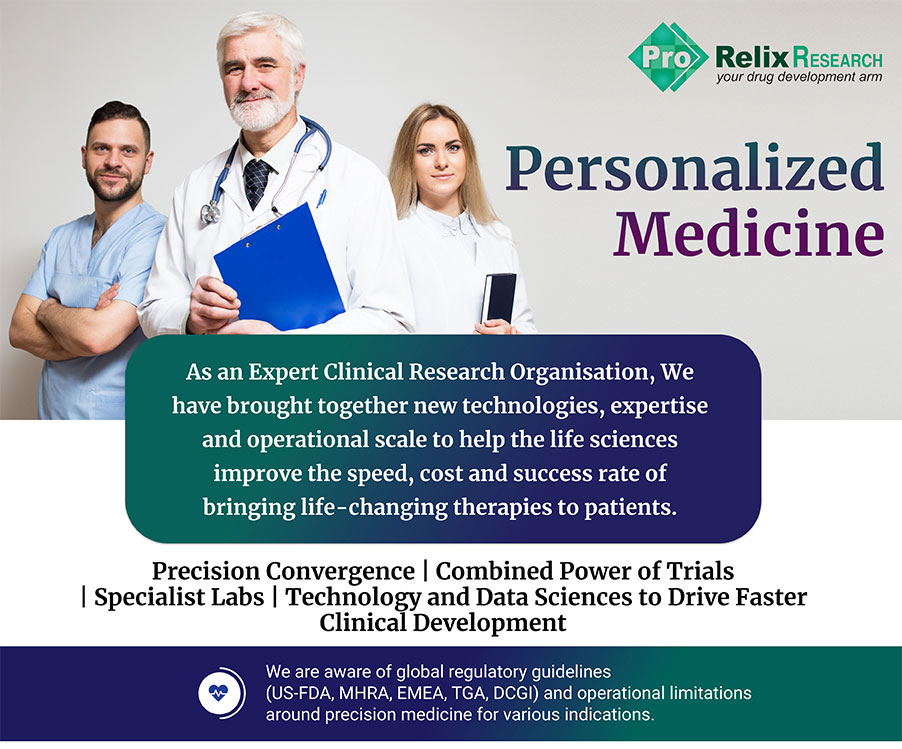At ProRelix Research we understand that realization of the full potential of the emerging field of personalized medicine is dependent on the design and execution of clinical trials. We can help you circumvent the unique challenges associated with conducting precision medicine trials throughout your journey, all the way from using a decentralized approach for patient recruitment and partnering with bioassay experts. Our services and knowledge experts in this field will ease the clinical trial process facilitating regulatory approval.
Personalized medicine (or precision medicine) is an innovative approach that considers an individual’s genetic make-up, environment, and lifestyle factors to inform decisions on prevention and treatment of diseases. This approach differs drastically from the “one-size-fits-all” conventional medicine approach wherein patients with the same disease will be treated in the same way. Advancements in the fields of genomics, proteomics, metabolomics, and availability of large-scale biological databases coupled with computational tools for analyzing data has enabled the progress of personalized treatments. In 2020, personalized medicine therapies accounted for 39% of all new drugs approved by the United States Food and Drug Administration (FDA). Most of these were oncology treatments based on treatment of subpopulations expressing certain biomarkers that can be used to predict responses. Identification of genetic mutations and dysregulations in cancerous cells can help develop targeted therapies which forms the basis of precision oncology, a rapidly advancing field in cancer therapy. Therefore, the appropriate selection and qualification of biomarkers forms an integral part of personalized medicine development.
The classical cookie cutter approach for the conduct of clinical trials is based on administration of the test treatment to a large population of patients in Phase I-III studies followed by the decision to use or not use the treatment based on an average response. Although this approach has been used for several years and forms the basis for approval of drugs by the FDA and other regulatory authorities, it fails to consider genetic and lifestyle differences between individuals. This can cause some patients to be unresponsive to the ‘superior’ treatment as judged from the conventional clinical trial due to gene mutations that can affect how the drug acts in the body. The foundation of personalized medicine is to provide the right treatment to the right person at the right time and besides for providing an ideal treatment for patients it also has the potential to save pharmaceutical companies considerable time and money by boosting their chances of success.
The classical cookie cutter approach for the conduct of clinical trials is based on administration of the test treatment to a large population of patients in Phase I-III studies followed by the decision to use or not use the treatment based on an average response. Although this approach has been used for several years and forms the basis for approval of drugs by the FDA and other regulatory authorities, it fails to consider genetic and lifestyle differences between individuals. This can cause some patients to be unresponsive to the ‘superior’ treatment as judged from the conventional clinical trial due to gene mutations that can affect how the drug acts in the body. The foundation of personalized medicine is to provide the right treatment to the right person at the right time and besides for providing an ideal treatment for patients it also has the potential to save pharmaceutical companies considerable time and money by boosting their chances of success.

Like drugs and medical devices, approval of personalized medicines for marketing by regulatory authorities requires clinical trials to be conducted. Traditional clinical trials lack flexibility and are consist of a fixed protocol, interim analysis at predefined points, and interpretation of results based on a predefined statistical analysis plan. Personalized medicine lends way to the use of adaptive trial designs. Adaptive trials allow for prospectively planned modifications to one or more aspects of the design based on accumulation of information as the trial proceeds. Various aspects of the trial can be adapted such as sample size, patient population, treatment arm selection, endpoint selection, and allocation ratio. Adopting an adaptive design can make trials more flexible, efficient, ethical, and informative allowing for the use of fewer patients and therefore saving companies a considerable amount of money. Basket and umbrella designs in which either a targeted therapy is tested on different diseases with the same molecular alteration or multiple targeted therapies are evaluated on a single disease that is stratified into subgroups based on genetic markers are commonly used for personalized medicine trials and are amenable to adaptive trial formats. Alterations in allocation ratios, doses, and participant subgroups depending upon their responses to treatment can be made during the trial allowing for selection of a patient subpopulation that show the maximal response to a treatment. Another type of trial design most suited for personalized medicine is the N-of-1 trial design which focuses on a single patient. Identification of the patient as a responder or non-responder is based on data collection over a prolonged period. Integration of results from several N-of-1 trials will allow determination of certain subpopulations that will benefit from the treatment.
Despite the advantages of adaptive trials for personalized medicine there are several drawbacks resulting in their limited adoption. The limitations include cost associated with
N-of-1 trials, prolonged collection of patient characteristics that can be cumbersome, identification of suitable biomarkers, and most important hesitancy of regulatory agencies to shift their thinking from conventional trials.
Recognizing the specialized needs for personalized medicine clinical trials is essential to ensure success. Challenges such as patient recruitment due to subpopulations being studied, access to key opinion leaders (KOL) that have an adequate understanding of the disease, trial designs and statistical analysis, and availability of genetic testing facilities need to be overcome.

Experts at ProRelix research can help navigate the novel and challenging path for developing trials for precision medicine. We can help with the following
- Protocol development
- Patient recruitment: decentralized trial approach to enroll a larger target population, links to patient registries and advocacy groups
- Identification and management of relationships with KOLs
- Identification of sites with adequate facilities for bioassays and genetic profiling
- Statistical design of trials: basket or umbrella designs
- Interim analysis of results to modify the trial design, endpoints, allocation criteria, treatment arms Training site personnel on techniques and statistical protocols
- Sample management and storage services
- Data management and archival
- Site initiation and close-out activities
- Compliance with GCP and other regulatory guidelines
- Statistical interpretation of results and statistical analysis report (SAR) preparation
Need Support to Conduct your Personalized Medicine Clinical Trials?
We’d be delighted to assist you in conducting your Personalized Medicine Clinical Trials
Connect with our experienced staff today!!
Provide details of your requirements by clicking on the given link below and our professional team of clinical research experts will get in touch with you right away.




